Sign up. Be inspired. Get clicking.
How to book sustainable wildlife experiences online: choosing responsible encounters
How to book ethical wildlife experiences online: choosing responsible encounters
Nature-based tourism generates $600 billion annually, but not all wildlife encounters are beneficial for the animals. Unregulated tourism can degrade the ecosystems it seeks to showcase.
As global interest in sustainable travel grows, booking wildlife experiences online offers a powerful way to explore nature while prioritizing animal welfare and conservation. With nature-based tourism generating $600 billion annually, not all encounters are ethical, and irresponsible practices can harm ecosystems as noted earlier. This guide provides practical strategies for selecting responsible wildlife tours online, using platforms with sustainable filters like Responsible Travel and Ecotourism Australia. By choosing certified operators, supporting local communities, and avoiding exploitative activities, travelers can ensure their adventures are both meaningful and environmentally friendly. Learn how to navigate online tools to plan eco-conscious trips that protect wildlife and preserve natural habitats.
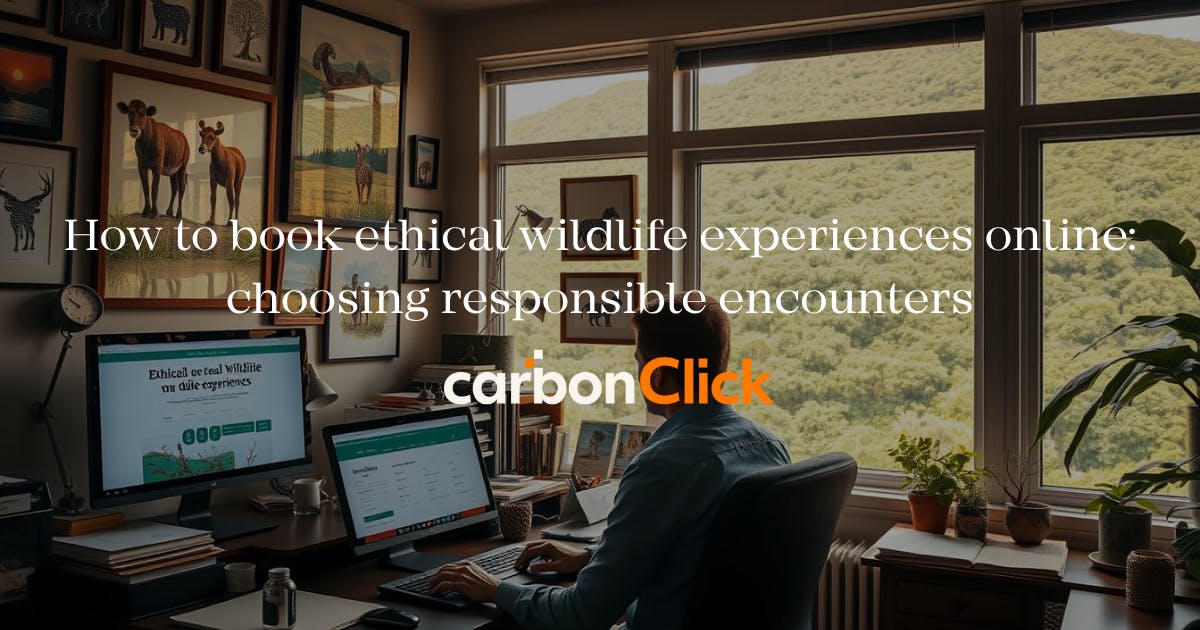
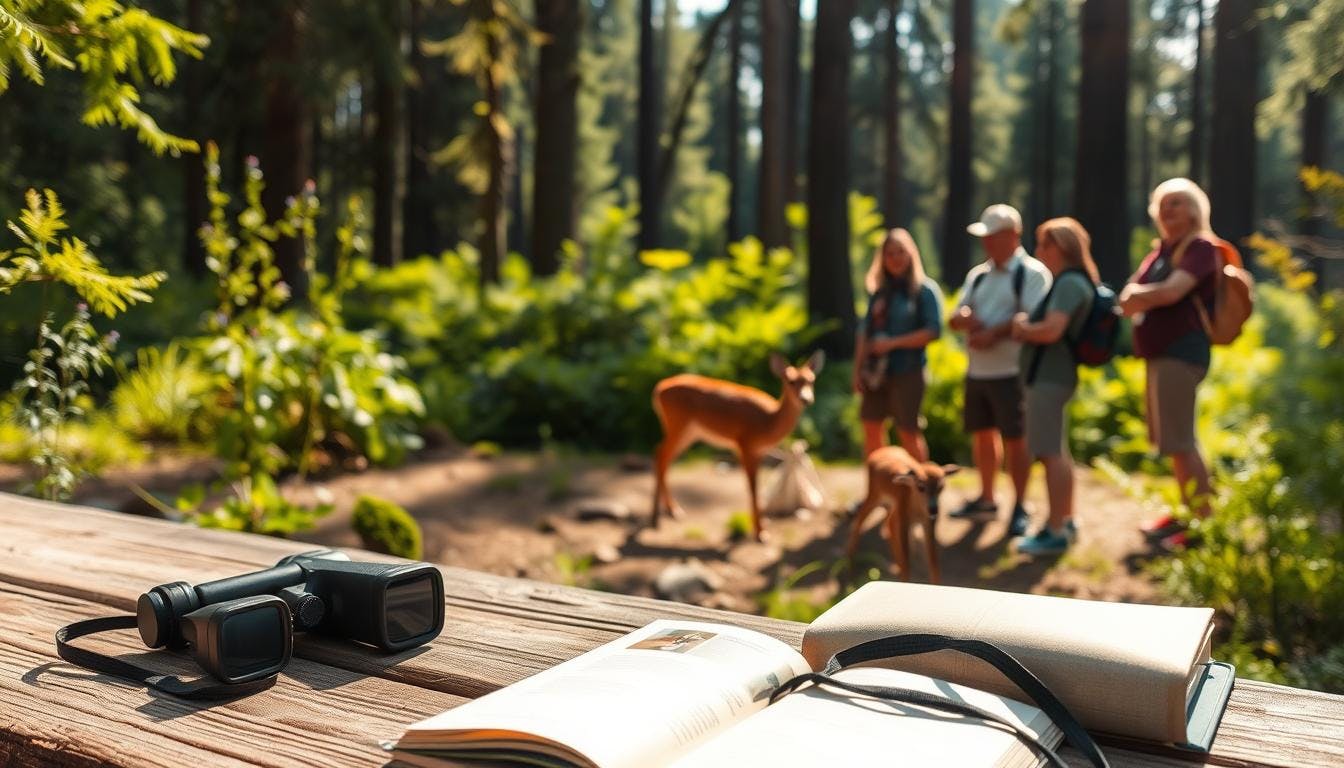
Booking wildlife tours in a sustainable way
As travellers learn more about how their actions affect the environment, they want more responsible wildlife experiences. This article tells you how to book tours that put animal welfare and conservation first.
Important points
- Learn how wildlife tourism affects the ecosystems around it.
- Learn how to find wildlife tour operators who are responsible.
- Find out how sustainable wildlife experiences can help you.
- Learn how to book wildlife tours that help protect animals.
- Look into how technology can help make wildlife encounters more ethical.

What is sustainable wildlife tourism?
Sustainable wildlife tourism is all about experiences that are beneficial for animals and the environment and that last a long time. It means watching animals in their natural homes without bothering or hurting them. This method ensures the treatment of animals with respect and care.
This way, tourists can help the ecosystems they visit, leaving behind a better ecosystem than they met it.
- Watching animals in their natural environments
- Supporting efforts to protect nature
- Promoting the well-being of animals
- Helping local economies by being a responsible tourist; These actions depicts a sustainable wildlife tourism as idealy stated.
Why conservation is important
Conservation is an important part of responsible wildlife tourism. Tourists help protect endangered species and their homes by supporting conservation efforts. This help is essential for keeping ecosystems and biodiversity alive through the following activities:
- Paying for conservation projects
- Helping with research projects
- Encouraging people to care about conservation
Benefits for people who live there
Ethical wildlife tourism significantly benefits local communities. It can create jobs, boost local economies, and encourage cultural exchange. These benefits are very important for the health of communities that are involved in tourism.
- Job creation in the tourism and conservation sectors
- Making money from tourism to boost the economy
- Cultural exchange between tourists and people who live there
How to spot ethical behaviour in wildlife tourism
When planning a wildlife tour, you need to know what tour operators do that is right. This makes sure that the experience is safe and valuable. Reputable operators put the welfare of animals first, support conservation, and work with local communities. They are open about what they do and give people chances to learn them.
Important signs of ethical tours
Responsible animal viewing, support for conservation, and getting involved in the community are all signs of an responsile wildlife tour. Some important signs are:
- Keeping a safe distance from animals so they don't get upset
- Not supporting activities that hurt or exploit animals
- Donating money or time to conservation efforts or volunteering for them
- Giving out educational materials and guides that encourage people to protect wildlife
IMAGE
Questions to ask operators
Ask the right questions to find out if a tour operator is professional and sustainability oriented. Some important questions are:
- What do you do to make sure the animals are safe during tours?
- How do you help with conservation projects in your area?
- Can you tell me about the ways you get involved in your community?
- How do you teach your clients about protecting wildlife?
Getting to know animal welfare standards
When looking at tour operators, it's important to know what animal welfare standards are. Find operators who follow well-known rules and have rules in place to stop the abuse of animals. Don't go on tours that let you touch or feed wild animals, since these activities can be bad for them.
Travellers can help promote responsible wildlife tourism by being aware and careful. This helps protect wildlife and the places they live.

Looking into wildlife tour companies
To support responsible wildlife tourism, it is important to look into wildlife tour operators. It's very important for travellers to be careful when they choose. This makes sure that they back sustainable wildlife adventures and responsible safari tours.
How to tell good companies from bad ones
Animal welfare and conservation are important to good wildlife tour companies. If you want to find these companies, look for ones that are open about how they do business and what their rules are.
- Check to see if they are registered with the right tourism boards.
- Check out their website for clear information about what they do to protect the environment.
- Look for ties to well-known groups that work to protect the environment.
Using reviews and testimonials
Reviews and testimonials from people who have travelled with a tour operator can give you a lot of information about how they do business.
- To get a full picture, look for reviews on more than one site.
- Read what people say about how the operator interacts with animals.
- Find reviews that talk about how the operator works to protect the environment.
Noticing red flags
There are some things that a tour operator might do that show they are not honest. Watch out for operators that:
- Promise close or direct contact with animals.
- Don't have good records of animal welfare.
Put making money ahead of protecting the environment and teaching.
Travellers can choose verdant wildlife adventures if they are aware and careful. They can help safari tours that are good for the environment and the people who live there.
Relevance of certifications and accreditations
For wildlife tourism to be reliable, certifications and accreditations are very important. They show that a tour operator cares about animals, the environment, and the community. These credentials show that you have met certain requirements.
A bright, well-designed website interface that shows ideal ways to book wildlife tourism. In the foreground, there are a bunch of thumbnails that show different sustainable wildlife experiences, each with a clear certification badge or accreditation logo. The middle ground has a sleek search bar and filtering tools that let users customise their booking based on how verdant it is. In the background, there is a wide view of beautiful forests, clean beaches, and majestic wildlife habitats that gives the impression of responsible, immersive experiences. The overall mood is one of professionalism, openness, and a dedication to protecting natural areas.
Why certifications matter
It's important to have certifications from well-known groups. They make sure that tour operators follow certain rules. These rules cover how to care for animals, protect their habitats, and run educational programs. By choosing a certified operator, you are helping to protect the environment.
Some benefits of using certified tour operators are:
- Better care for animals
- Support for efforts to protect the environment
- Better learning experiences
- Good for the people who live there
Wildlife tourism groups that have been recognised
A number of groups give wildlife tour operators certifications and accreditations. Some famous ones are:
- The British Travel Agents' Association (ABTA)
- The International Ecotourism Society (TIES)
- The Global Sustainable Tourism Council (GSTC)
- The World Wildlife Fund (WWF)
How to check accreditations
Check the tour operator's website for certification logos to see if they are accredited. You can also look through the databases of well-known certifying bodies. It's also smart to read reviews and ask for references to make sure someone is trustworthy.
Travellers who choose certified tour operators help support responsible wildlife tourism. This choice is good for animals and the environment.
Examples of responsible wildlife encounters
There are many ways to have responsible wildlife encounters, such as going to sanctuaries or going on guided safaris. We can see animals in their natural habitats because of these experiences. They also help protect them.
Sanctuaries for wildlife vs. zoos
When thinking about wildlife encounters, it's important to know the difference between zoos and wildlife sanctuaries. Sanctuaries are places where rescued animals can live safely and comfortably. They often run educational programmes and help protect the environment.
Some people don't like zoos, but they can help with conservation and education. It's important to learn about the goals and methods of any organisation that works with wildlife.
Responsible wildlife safaris
Wildlife safaris are a fun way to see nature up close. Look for tour companies that follow environmental rules to make sure your safari is good for the environment.
- Choose operators that help protect the environment.
- Choose tours with small groups to have less of an impact on the environment.
- Respect animal habitats by following the rules set by your tour guides.
Tours of marine wildlife
Marine wildlife tours offer a unique opportunity to engage with marine life. To make sure these meetings are fair, think about the following:
- Choose tour companies that follow the rules and regulations in the area.
- Stay away from tours that let you touch or feed marine animals.
Support tour companies that care about the environment and help protect the ocean.
We can help protect animals and their habitats by choosing responsible wildlife encounters. Our choices have a positive effect, whether we go to a sanctuary, go on a safari, or take a marine wildlife tour.
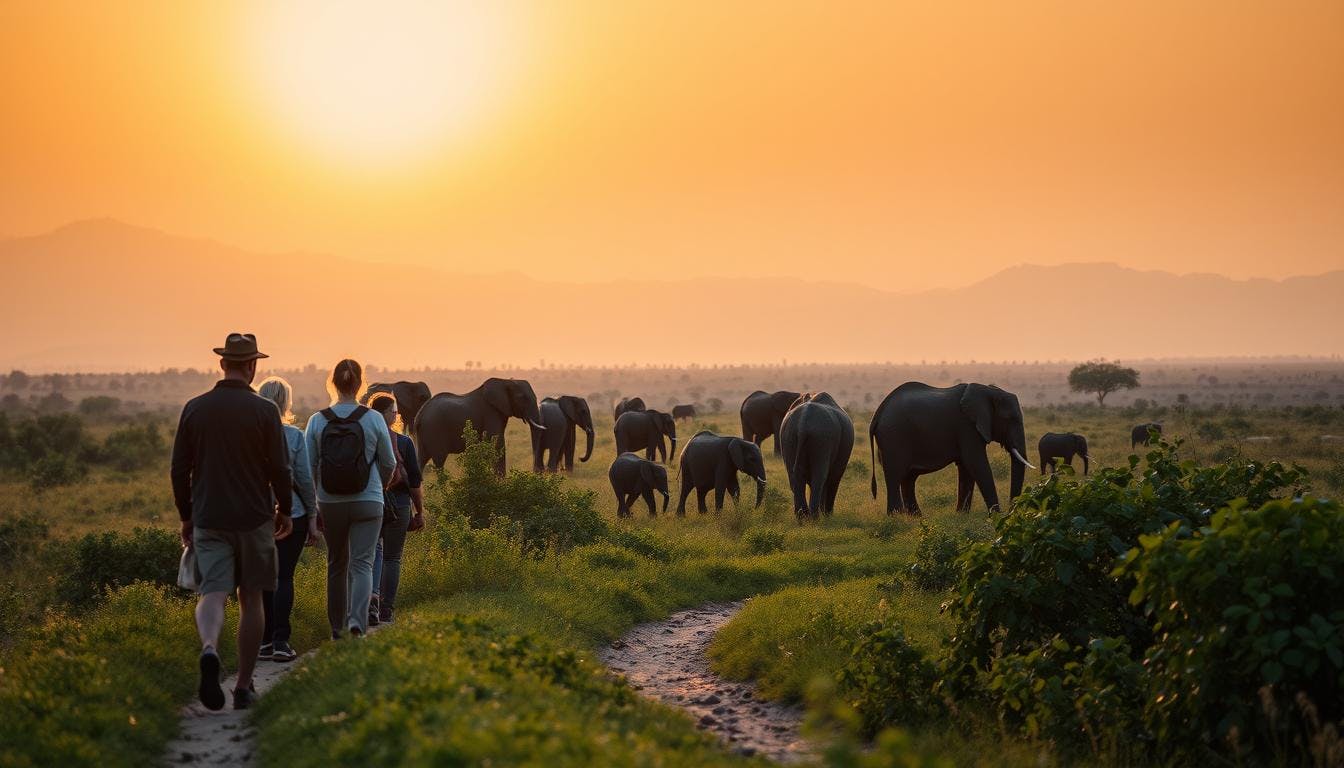
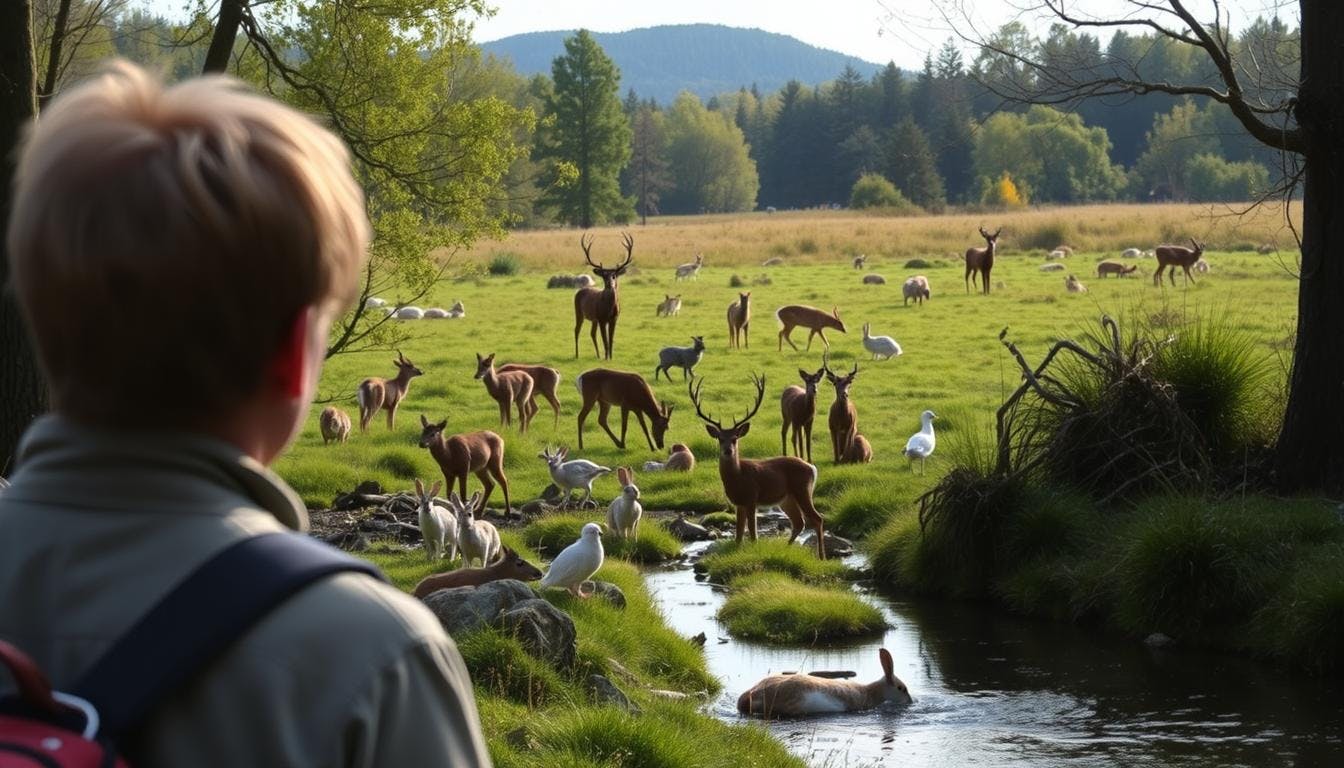
How to get the most out of your verdant travel
Careful planning and wise transport choices enhance sustainable travel experiences, reducing carbon footprints and fostering a suatainable travel culture.
Making plans for your trip ahead of time
Planning is key to sustainable travel. Research shows trains reduce CO2 emissions by 75% compared to planes. Use verdant travel tools to compare transport options and their environmental impact, enabling green commute services.
Using different types of transportation together
Combining transport modes, like trains for long trips and bikes or public transport for short ones, enhances sustainability.
- Explore available transport options to your destination
- Book early to secure the most sustainable options
- Consider multi-modal transport platforms for seamless bookings
Being open to changes in travel plans
Flexibility in travel dates or routes can uncover greener options, with off-peak travel reducing environmental impact and offering more verdant choices.
The effects of wildlife tourism on the protection of species
Wildlife tourism plays a complicated role in conservation efforts. It helps conservation efforts and shows how important it is to protect wildlife and their homes. Tourism that is good for animals can help protect species.
A forest canopy with leaves and dappled shadows dancing on the green ground. In the front, a family of endangered mountain gorillas grazes peacefully. Their majestic presence shows how responsible wildlife tourism can help conservation efforts. In the middle ground, a group of travellers watches the scene with looks of awe and respect on their faces. This is the essence of an ideal wildlife encounter. In the background, rolling hills and far-off peaks frame the peaceful scene, which is lit by warm, golden light coming through the leaves.
Examples of successful conservation efforts
Several case studies show that wildlife tourism can help protect species. For instance, money from tourism in Africa's national parks has helped protect the environment. This has helped keep animals like elephants and rhinos from going extinct.
- Tourism money pays for programs that stop poaching and restore habitats.
- Job creation and economic growth are good for local communities.
- Conservation programs keep an eye on and protect wildlife populations.
How tourism can help pay for protection efforts
There are many ways that wildlife tourism helps pay for protection efforts. This includes fees for tour operators, donations, and taxes from the government. These donations help pay for conservation projects like:
- Protecting and restoring habitats.
- Programs for research and monitoring.
Conservation projects that involve the community.
Tourists can directly help these efforts by going on wildlife conservation vacations and eco-friendly wildlife adventures. This helps protect species and encourages responsible tourism at the same time.
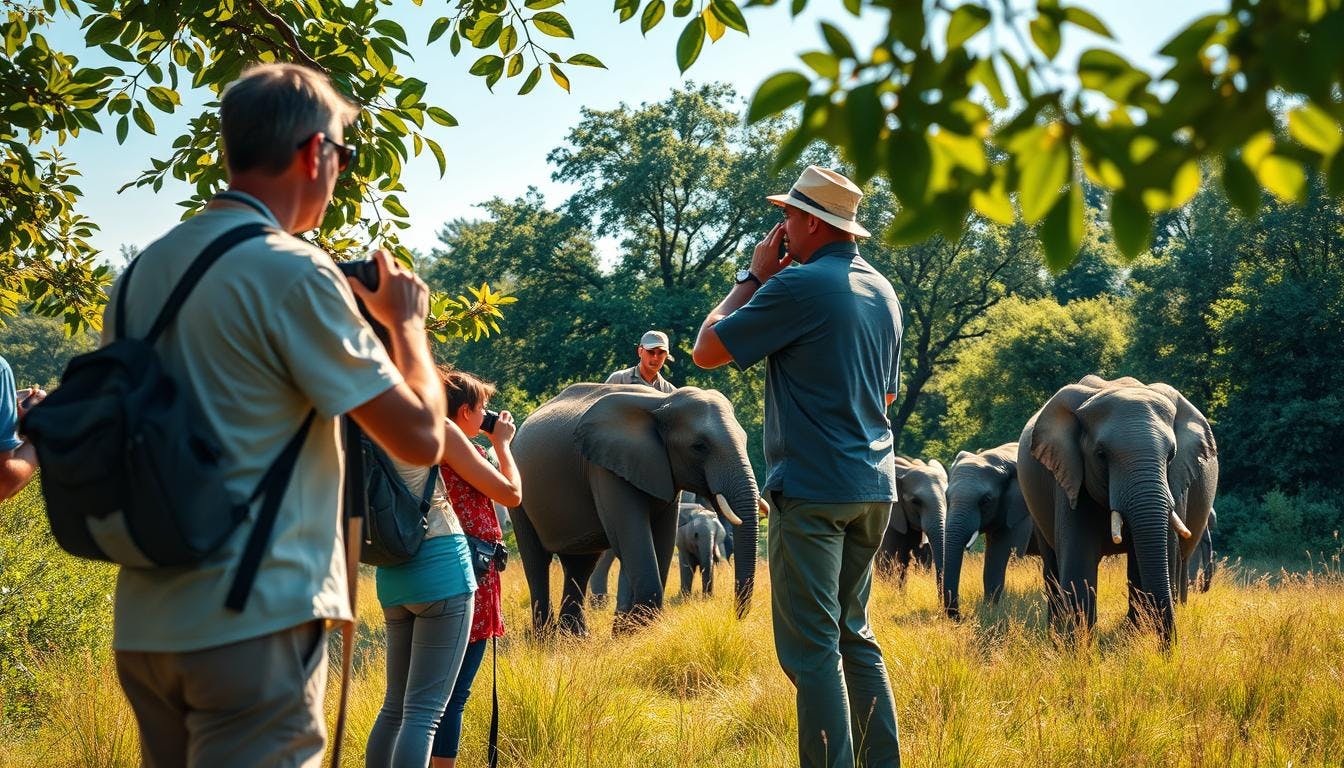

Integrating sustainable transportation into your daily life
Getting involved with local communities
Connecting with local communities is an important part of ethical wildlife tourism. It encourages people from different cultures to meet and do business with each other. When people go on community-based tourism trips, they help the local economy. They also learn more about the area's wildlife and culture.
Advantages of tourism in the community
There are many benefits to tourism that is based in the community. It protects cultural heritage and helps local businesses grow. Travellers help create jobs and boost economic growth in rural areas by supporting local tour operators.
- Encourages travellers and locals to share their cultures
- Helps local economies by creating jobs and bringing in money
- Encourages people to keep their cultural heritage and traditional ways of doing things
How tours help local businesses
Tours that get involved with local communities can really help the economies of those areas. Travellers can make sure their money helps the local people by choosing responsible wildlife tour companies.
- Working with local businesses and service providers
- Giving local guides and staff jobs
- Investing in projects that help the community, like education and conservation efforts
Making sure that interactions with locals are ethical
Travellers should be polite and follow local customs and traditions to make sure they interact with local communities in an ideal way. This means dressing modestly, taking off your shoes when you need to, and not taking pictures of people without their permission.
Making your wildlife experience reservations online
It's easier to find and book wildlife experiences that care about animals and protect them; thanks to online booking sites. There are a lot of choices, so it's important to know how to use these platforms, this makes sure that the adventure is safe and fun.
How to book ethical tours
There are a number of websites that focus on booking ethical wildlife tours. They have a lot of different things to do that will appeal to a wide range of tastes and interests. Some well-known choices are:
- Platforms that work with local conservation groups to give people one-of-a-kind wildlife experiences.
- Websites that give a lot of information about tour companies and the work they do to protect the environment.
- Booking sites that let users narrow down their search for tours by certain factors, like how they affect animals and the environment.
When picking a platform, look for ones that make it easy to find information about their tour guides and the conservation projects they support.
Tips for a smooth booking process
Follow these tips to make sure the booking process goes smoothly:
- Read what other travellers have to say about the tour operator to see how good and responsible they are.
- Know what the tour operator's rules are about animal welfare, conservation, and getting involved in the community.
- Check to see if the tour operator has the right licenses and certifications.
- Read the terms and conditions of the booking very carefully.
If you do your research and book carefully, you can have a fun wildlife experience that helps protect animals and their habitats.
IMAGE
Getting ready for your wildlife tour
Before going on a wildlife tour that is good for the environment, you should know the local laws and bring the right things. Getting ready for your tour can make it a lot better and have less of an effect on the environment.
What to bring for an ethical encounter
It's important to pick the right gear for a responsible wildlife tour. Here are some things you need:
- Clothes that are comfortable and neutral-colored so you can fit in with the surroundings
- A water bottle that can be used more than once to cut down on plastic waste
- Binoculars for watching animals from a distance
- Sunscreen and bug spray that are good for the environment
- A camera with a telephoto lens lets you take pictures without bothering the animals.
If you use the right gear, you can leave a smaller mark and have more fun on your tour. For instance, using a water bottle that you can use again and again can help cut down on plastic waste a lot.
Learning about the laws about local wildlife
To avoid hurting animals or breaking the law, you need to know the rules and laws about wildlife in your area. These rules keep animals and their homes safe.
You should learn some important things, such as:
- Protected areas and any activities that are not allowed in these areas
- Rules about feeding or touching wild animals
Some activities or getting into certain areas require permits or licenses.
You can help with conservation efforts and support sustainable wildlife conservation holidays by staying up to date and following the law in your area.
Pushing for responsible wildlife tourism
Our support for responsible wildlife tourism is important for the future of wildlife conservation. We travellers have the power to change the industry. We can do this by going on responsible wildlife tours and encouraging encounters with animals that are fair.
Telling people about responsible behaviour
To support ideal wildlife tourism, we need to tell people about responsible ways to do things. We can spread this message through blogs, social media, and talking to people. We can make a difference by teaching others how important it is to have ideal interactions with animals.
- Post articles and videos on social media about how to be a responsible wildlife tourist.
- Write reviews and testimonials about good experiences with tour companies that are honest.
- Talk about the benefits of responsible wildlife tours in online forums and discussions.
Getting friends and family to join in
It's important to get your friends and family to go on ideal wildlife trips. We can create a culture of responsible tourism by getting our loved ones involved.
Here are some ideas for getting other people to join in:
- Ask your friends and family to go on a responsible wildlife tour with you.
- Tell personal stories and experiences that show how ideal animal encounters can have a positive effect.
- Give suggestions for tour companies that care about animals and do a good job.
We can make a big difference if we work together. We can help make the wildlife tourism industry more responsible and sustainable.
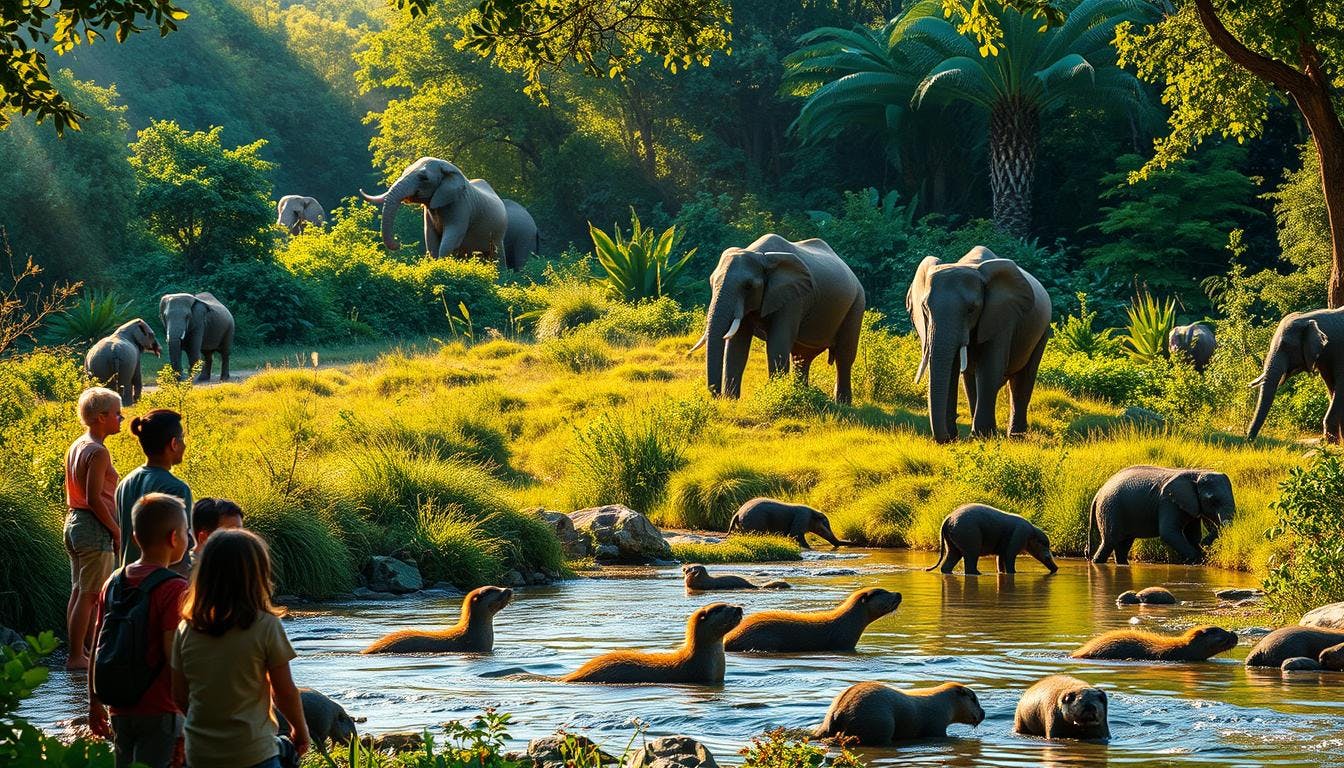
The future of responsible wildlife tourism
There is a lot of interest in verdant and sustainable travel, which is good news for the future of ideal wildlife tourism. As people learn more about how their actions affect the environment, the need for responsible tourism grows. This change is pushing the industry to use more environmentally compatible methods.
New trends
Responsible travel is changing, and now it focuses on conservation and projects that help communities. People who travel now want to have experiences that help both animals and the people who live there. This trend is changing the way people travel.
Technology in eco-friendly travel
To make tourism more sustainable, technology is very important. It's easier to book nature-based tours online. Digital tools also aid in monitoring wildlife and bolstering conservation efforts. By using technology, the industry can encourage more responsible and sustainable behaviour.
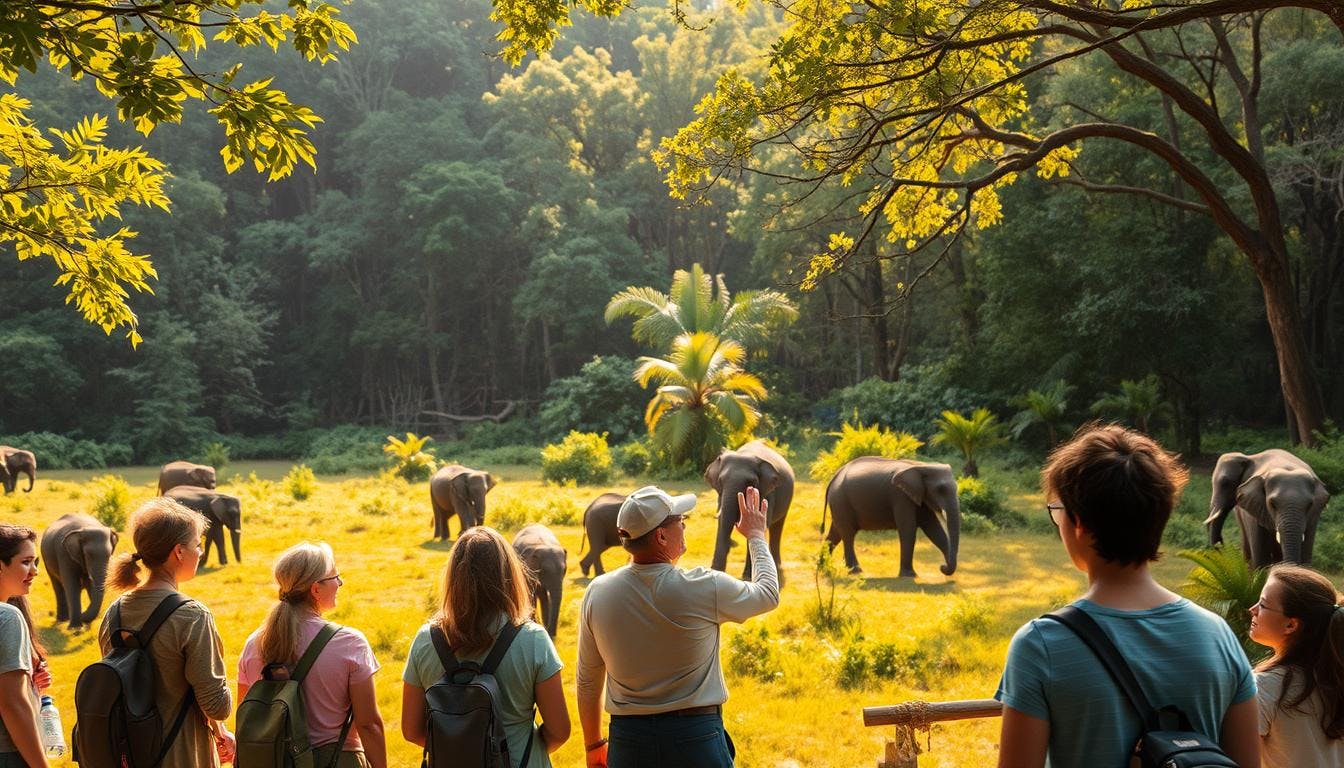
17 South Street
Auckland 1010
New Zealand
info@carbonclick.com- -
- X
Subscribe now to stay up to date with CarbonClick, carbon offsetting and climate action.
By signing up you agree to our Privacy Policy.


